On 6 November 2025, a round table discussion entitled "Certification of Sustainable Construction: International Experience and Local Solutions in the Context of Decarbonisation” took place at the Ukrinform press centre (Kyiv). Participants discussed the alignment of Ukrainian processes with the EU's vision for decarbonisation, as well as transparency and openness in creating an investment-friendly environment for sustainable reconstruction of Ukraine.

Despite the difficult conditions of full-scale war, the construction sector is demonstrating signs of restoring construction volumes. According to data of the State Statistics Service of Ukraine reported by Interfax-Ukraine, in January-July 2025, the volume of work performed increased by 16.1%. This creates the conditions for integrating sustainable development principles, European regulations and international certification as a basis for engaging donor funds and investments.

The participants of the round table began the discussion by emphasizing that the basis for sustainable reconstruction shall be laid through legislative harmonisation. Member of Parliament of Ukraine Bohdan Kytsak stressed: The foundations are being laid right here and now. In order for the construction industry to develop in an international context, we need to bring Ukrainian standards in line with European standards, especially with regard to fire safety and wooden structures.

This strategic necessity was confirmed by Olena Voskobiynyk, Director of the Department of Technical Regulation in Construction at the Ministry of Communities and Territories of Ukraine: Construction Products Regulation (EU) focuses on environmental friendliness, reuse of materials, and digital product passports. Work is already underway in Ukraine on a strategy for its implementation — gradually and in sync with the countries of the European Union," she noted.

An important topic of discussion was the role of business in implementing sustainable standards. The Director General of the Confederation of Builders of Ukraine, Oleksandr Chervak, noted that the private sector could become the driving force behind Ukraine's reconstruction if state policy ensured clear rules of the game and promoted innovation.
“Business is ready to work under new rules if they are a condition of donors. We already have examples, such as the Finnish school restoration project in Mykulychi, which is being built according to zero energy consumption principles. Such initiatives show that sustainable standards can and should become the norm," said CBU CEO Oleksandr Chervak.

The topic of integrating sustainable approaches into reconstruction was continued by Anna Akermann, an analyst on green reconstruction in Ukraine. She emphasised that the transition to sustainable standards requires consideration of the entire life cycle of a building, which minimises its environmental footprint.
“Over a quarter of carbon emissions during post-war reconstruction are linked to the production of building materials. To minimise the impact, it is necessary to apply modern technologies and international standards and to plan buildings with their entire life cycle in mind," she explained.

Local initiatives are already demonstrating the practical implementation of sustainable solutions, but their scaling up requires recognition at the government level. Kateryna Pylypchuk, Vice President of FIABCI-Ukraine, confirmed this: “The Rebuild Green 2030 programme demonstrates that sustainable solutions are possible even in small communities. However, in order to scale up, we need to harmonise national building codes with European requirements and recognise certificates from manufacturers who already have environmental certification in the EU”.

International certification is the tool that verifies environmental criteria and ensures the trust of international donors. Roman Gryshchenko, co-founder of the Ukrainian Green Building Council, explained: “Green certification takes into account everything from the origin of materials to the conditions of their supply. Under BREEAM and DGNB standards, a building cannot obtain certification unless it uses wood from FSC or similarly certified sources. It is precisely these criteria that build investor confidence, as they confirm stability not with words, but with specific measurable indicators”.

However, certification will only become widespread when the requirement for it becomes dominant in the market. Svitlana Berzina, president of the All-Ukrainian Environmental Organisation Living Planet, drew attention to who is a change driver: "Today, it is the customer or investor who determines market policy. If public and private investors start demanding sustainable approaches, certification will become an integral part of construction projects. In addition, FSC certification is recommended by the European Commission as one of the criteria for assessing the sustainability of building materials”.

Pavlo Kravets, FSC Ukraine National Representative, spoke about the place of FSC certification in the system of international and national standards for sustainable construction, in particular, about the benefits of project certification for architects and developers, as well as financial donors who want to be confident in the sustainable origin of wood for construction. He summed up the round table discussion: “Green reconstruction is not about a set of technical standards, but rather a philosophy and development strategy. It combines economic, social and environmental interests, creating a foundation for a sustainable future. Thanks to this approach, we can ensure transparency and the trust of society and donors, ultimately ensuring Ukraine's integration into the European space. FSC builds and maintains a platform for dialogue and synergy of efforts among all actors in the direction of green recovery.

The round table demonstrated that Ukraine's green recovery is not only a responsibility but also a competitive advantage in attracting international investment and accessing European markets. Its successful implementation requires systematic cooperation between all stakeholders, and international and national standards complement each other, forming a multi-level quality system. Realising this potential depends on the willingness of all participants to engage in ongoing dialogue, exchange experiences and jointly seek optimal solutions.

